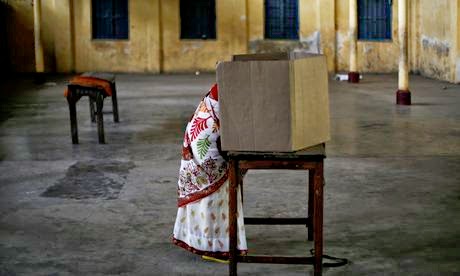Courtesy of AP
Dating back to the 1990s, India has been lauded as a rapidly developing economy for decades. Industrial deregulation, privatization of state-owned enterprises, and other free-market initiatives spurred growth to record heights - between 1997 and 2011, India's economy grew at just under 7% annually. Things started to slow down around 2010, primarily due to a lack of FDI, a problem not unique to India. Developing nations across the globe suddenly found that due to high interest rates and the disappearance of vast swaths of capital from the pre-recession days, outside investment in their economies was not what it had been. Because of this, India is now charged with tackling its major issues - extremely poor infrastructure, high inflation, and pervasive poverty - relatively on its own. The poverty problem is especially important: while India ranks #4 in terms of GDP at just under $5 trillion, they rank #168 when it comes to GDP per capita, at just $4,000 per person.
Mr. Modi and his BJP party have dominated the polls thus far primarily because of their change in policy from the incumbent Congress Party, and their commitment to improving on these various issues. Today, the BJP released a a 52-page manifesto detailing their intentions on curbing political malfeasance, improving infrastructure throughout the country, and focusing on job creation. Furthermore, the plan highlighted methods that would be used to attract greater FDI back to a wide variety of sectors.
A third party, the Aam Aadmi Party, is also hoping to secure victories during the elections, although the BJP is worried that their few victories won't necessarily put them on the map politically, but will strip votes the BJP otherwise would be winning. The Aam Aadmi Party is campaigning on a strong anti-corruption platform, although structurally they have not put forth much in terms of substantial policy changes and have been seen by other parties as "immature".
Courtesy of AFP/Getty Images
While there is clear and overwhelming support for a change from the norm - a U.S.-based Pew Research poll indicated that just 29% of Indians surveyed were content with the country's direction - many fear that a large victory for the BJP would still not be enough to win the party majority in the parliament. Should this happen, the parliament could become a messy political arena where very little gets accomplished.
Regardless of the outcome, it is apparent that the leadership of India following this election will need to focus on the issues that have been raised and continue to plague the country. With the economy still declining, jobs scarce, and broad economic inequality, what India needs, no matter who becomes the majority party, is reform on various fronts and direction towards a better economic climate with less political corruption.


No comments:
Post a Comment